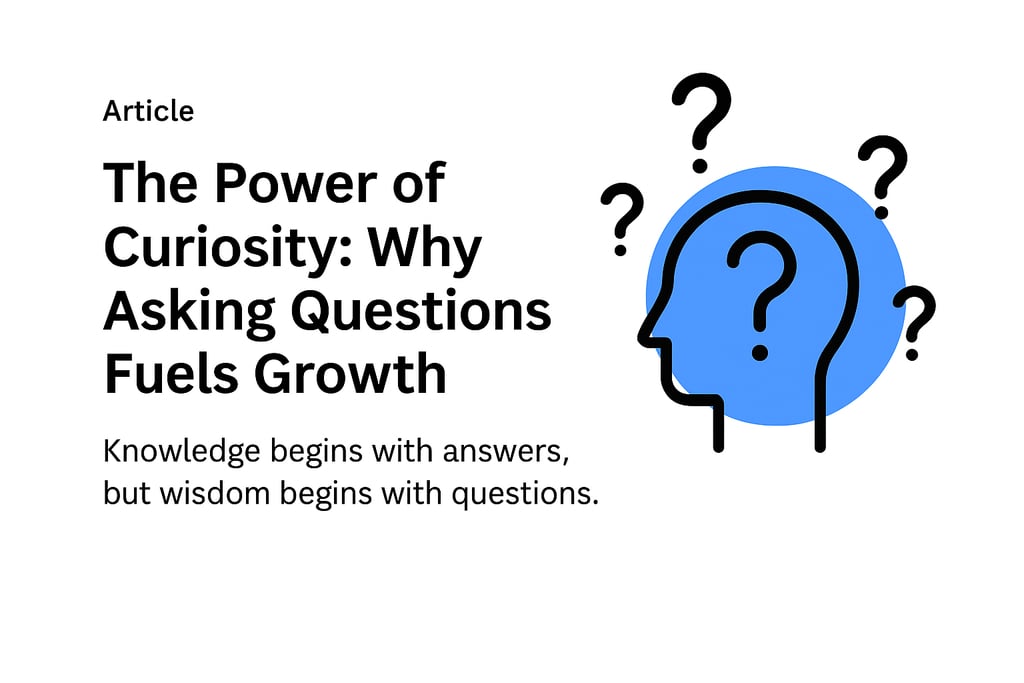The Power of Curiosity: Why Asking Questions Fuels Growth
Knowledge begins with answers, but wisdom begins with questions.
ANDHIKA & CO.
Andhika & Co. Insight Team
9/7/20253 min read


The most transformative discoveries in history did not come from people who had all the answers, but from those who were willing to ask bold, simple, and even uncomfortable questions.
Rediscovering the Instinct We Once Had
As children, curiosity comes naturally. We ask endlessly:
“Why is the sky blue?”
“Why do people work?”
“What happens if I try this?”
At that stage, curiosity is not a strategy — it’s survival. It helps us learn language, navigate the world, and understand relationships. But as we grow older, something begins to shift.
We are taught to value certainty over questioning. School systems often reward the “right” answer rather than the quality of the question. Workplaces sometimes see curiosity as inefficiency or distraction. Over time, many of us suppress the instinct to wonder.
And yet, curiosity — that simple act of asking — remains one of the most powerful tools for learning, innovation, and resilience.
Why Curiosity Is a Competitive Advantage
Curiosity is more than just a personality trait; it is a mindset with practical, measurable impact:
Curiosity expands knowledge. Every skill, from coding to cooking, starts with a single question: “How does this work?” Without curiosity, knowledge stagnates.
Curiosity drives innovation. Every breakthrough — from electricity to the internet — started with someone daring to ask, “What if…?”
Curiosity builds empathy. When we ask others about their experiences, beliefs, or struggles, we understand them beyond stereotypes. Asking “Why do you see it that way?” opens doors to collaboration.
Curiosity fuels resilience. In uncertain times, fear asks, “What if I fail?” Curiosity reframes it as, “What might I learn if I try?”
Curiosity doesn’t just make us smarter. It makes us more human.
The Hidden Barriers to Curiosity
If curiosity is so powerful, why do so many of us lose touch with it?
Fear of looking ignorant. Many adults avoid asking questions because they fear appearing unprepared or less intelligent. Ironically, the refusal to ask often keeps us uninformed.
The pressure of efficiency. In fast-paced workplaces, taking time to ask questions can feel like slowing down. Curiosity often clashes with the culture of constant output.
Overconfidence. Believing we already know enough makes us stop looking deeper. It’s not lack of intelligence, but lack of humility that kills curiosity.
The truth is: curiosity requires courage. It asks us to admit what we don’t know.
How to Cultivate a Curious Mindset
The good news is that curiosity can be practiced, like a muscle. Here are practical ways to reawaken it:
🔍 Ask “Why?” three times. When faced with a situation, don’t stop at the surface. Each “why” uncovers a deeper layer of truth.
📚 Step outside your field. Read a book, listen to a podcast, or attend a class in an area you know nothing about. Cross-pollination often sparks fresh ideas.
👂 Listen without planning your reply. When speaking to others, focus only on understanding. Curiosity thrives on genuine listening, not quick responses.
📝 Keep a curiosity log. Write down every small question that comes to mind during the day. Over weeks, you’ll notice patterns — and maybe even discover a question worth pursuing deeply.
🌍 Travel with intention. Even if it’s just within your city, explore unfamiliar places. Curiosity grows when exposed to new perspectives and environments.
The Ripple Effect of Curiosity
Curiosity doesn’t just benefit individuals; it transforms organizations and communities.
In companies, curious leaders ask their teams, “What are we missing? What could we try differently?” This creates cultures of innovation rather than fear.
In education, teachers who encourage questions produce students who think critically instead of memorizing blindly.
In relationships, curiosity keeps conversations alive. Asking partners, friends, or colleagues about their inner worlds deepens bonds.
When curiosity spreads, it creates ecosystems where learning and creativity thrive.
Final Thought
Curiosity is not about knowing less; it is about recognizing that there is always more to know. It is the humility to say, “I don’t have all the answers,” paired with the courage to ask anyway.
In a world that rewards certainty and speed, curiosity invites us to slow down, wonder, and explore. It helps us move beyond the obvious, see hidden connections, and discover opportunities others overlook.
Because the future will not be built by those who know everything, but by those who keep asking:
Why? What if? What else?

